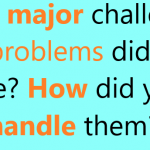If you are asked this question in an interview it can be rather awkward knowing how to answer it. You obviously need to be [Read more…] about How to Answer: What Are Your Strengths? Interview Question
How to Answer What can you do for this company? interview question
How to answer “What can you do for this company?” interview question. What would be your best answer? [Read more…] about How to Answer What can you do for this company? interview question
How to Answer What major challenges and problems did you face? How did you handle them?
How to Answer “What major challenges and problems did you face? How did you handle them?” interview question. What would be your best answer for this question? [Read more…] about How to Answer What major challenges and problems did you face? How did you handle them?
How to Answer Difficult Interview Questions
Last updated : 10 October 2018
What would be your best answer for the interview questions? What did you like or dislike about your previous job?, What were your expectations for the job and to what extent were they met? and What Was the Biggest Accomplishment / Failure in This Position?.
What Was the Biggest Accomplishment / Failure in This Position?
Your biggest accomplishment
Doesn’t necessarily have to be work related, could be personal – passed your driving test etc. You interviewer wants to know what made you proud of what you have achieved.
They will be looking to see how you accomplish tasks that you are proud of and how much work you are prepared to put into it to make sure you succeed.
Your biggest failure
If there is something that it will be all too engraved in your mind. Try to explain this to your interviewer in a factual way. If there isn’t something then don’t worry just maybe explain that although it was not your biggest failure as you don’t believe you have had one although XYZ was a disappointment to you but you did XYZ and to turn this around.
Try and make both answers to the questions directly related to the role that you are being interviewed for making your answers relevant and specific.
The questioned is asked frequently to assess what your future performances could be like and if you have had a particularly stressful time that you dealt with it effectively and it didn’t hinder any further roles.
Be honest but specific and relevant when answering this question.
Example Answer
My biggest accomplishment in my last role was training one of my pupils how to control their pitch in their voice, and they are currently selling top ten singles in the charts! I am very proud of them, and proud of myself for that. I would have to say that perhaps my biggest failure in that position was not being able to get my dance group through to the finals of a national competition, however we tried our best.
What did you like or dislike about your previous job?
This can be a tricky question of sorts. How you answer it will tell a lot about your thoughts and personality. No pressure there then.
Be diplomatic. Your interviewer wants to know what you liked about your previous role so they can assess if there is something similar in their environment and also what you like and how you like to work.
What did you like? Make sure your answer is sensible!
Don’t answer that you liked the people or anything like that as the only answer. Make sure you say something like you enjoyed the variety of work given or the freedom to manage your own time etc.
Regardless of them being a past employer it is never a good idea to speak badly of them, it reflects badly on you.
What did you dislike? I think most people have a few things that they dislike about any job. Explaining that to your potential new employer is a different matter. Make a list about what you did dislike and work through it. For example if you disliked:
Think about those 3 examples and try and answer them with a positive slant.
The hours – you are contracted to 40 hours a week with an hour for lunch – you want to work through your lunch and finish an hour earlier except you work through your lunch and probably work an hour over. This happens a lot but to your interviewer you would need to say that you disliked the hours due to not being able to work flexibly. A lot of employers are now a lot more open to people working flexibly.
The salary – possibly the one thing people are rarely satisfied with – explain that you have not had a pay review for X amount of time and you find this disappointing.
Repetitive Tasks – you do the same jobs over and over day in day out – explain that you are keen to do a variety of tasks as well as the more mundane ones that are essential.
Just remember to be diplomatic and positive and this question will be easy to answer.
What were your expectations for the job and to what extent were they met?
This question is referring to your experiences in your previous employment. It is a question designed to make you think and the most important part of your response is in how you answer the question rather than the answer itself.
It can be tempting to get drawn into the negatives of the last job, there will be a reason why you don’t work there anymore. However, it is important to remember that the more negative your answers, irrespective of their content, the more negatively the interviewer will start to see you. Therefore, you should answer this question in as positive a way as you can.
For example
When I took my previous post I was hoping to gain experience in this industry, honing my skills along the way in order to meet my ambitions of career progression. However, due to a recent downturn in profits, the prospect of promotion has all but disappeared. This made me feel like it was the right time to move on. Looking at your company, I can see that such opportunities exist with right amount of enthusiasm and hard work and I am therefore, very excited to be given the opportunity to work here.
This answer starts positive, then delves into a negative aspect before finishing on a positive note. This is known as the bath tub effect and should leave the interviewer with a positive impression of you.
With some good insight into the way the company works, you should be able to find a way to tailor your answer to match in with there ethos. If not then try to answer the question positively, The more you practice delivering your answers, the more confident you will become. This will then shine through in the interview and will hopefully leave the interviewer with a positive impression of your performance.
Best Answers for Job Interview Questions
Last updated : 14 October 2018
What would be your best answer for the job interview questions below? Who was your best boss and who was the worst?, [Read more…] about Best Answers for Job Interview Questions
How to Answer Job Interview Questions
What would be your best answer for the following interview questions?: Do you take work home with you?, How many hours do you normally work?, Describe a typical work week. [Read more…] about How to Answer Job Interview Questions
How to Answer: What do you expect from a supervisor?
Last updated : 14 October 2018
This question is a great opportunity for you to show your potential for development and career progression. [Read more…] about How to Answer: What do you expect from a supervisor?
How to Answer: How Would You Describe the Pace at Which You Work?
How to answer “How would you describe the pace at which you work?” interview question. What would be your best answer? [Read more…] about How to Answer: How Would You Describe the Pace at Which You Work?
How to Answer: What are your pet peeves? Interview Questions
Last updated : 10 October 2018
Your response to the question “What are your pet peeves?” will help the interviewer determine if you would be a good fit with the company culture. [Read more…] about How to Answer: What are your pet peeves? Interview Questions
How to Answer: When was the last time you were angry? What happened?
Last updated : 21 January 2020
When the interviewer asks “When Was The Last Time You Were Angry? What Happened?” he or she wants to know if you lose control. [Read more…] about How to Answer: When was the last time you were angry? What happened?










